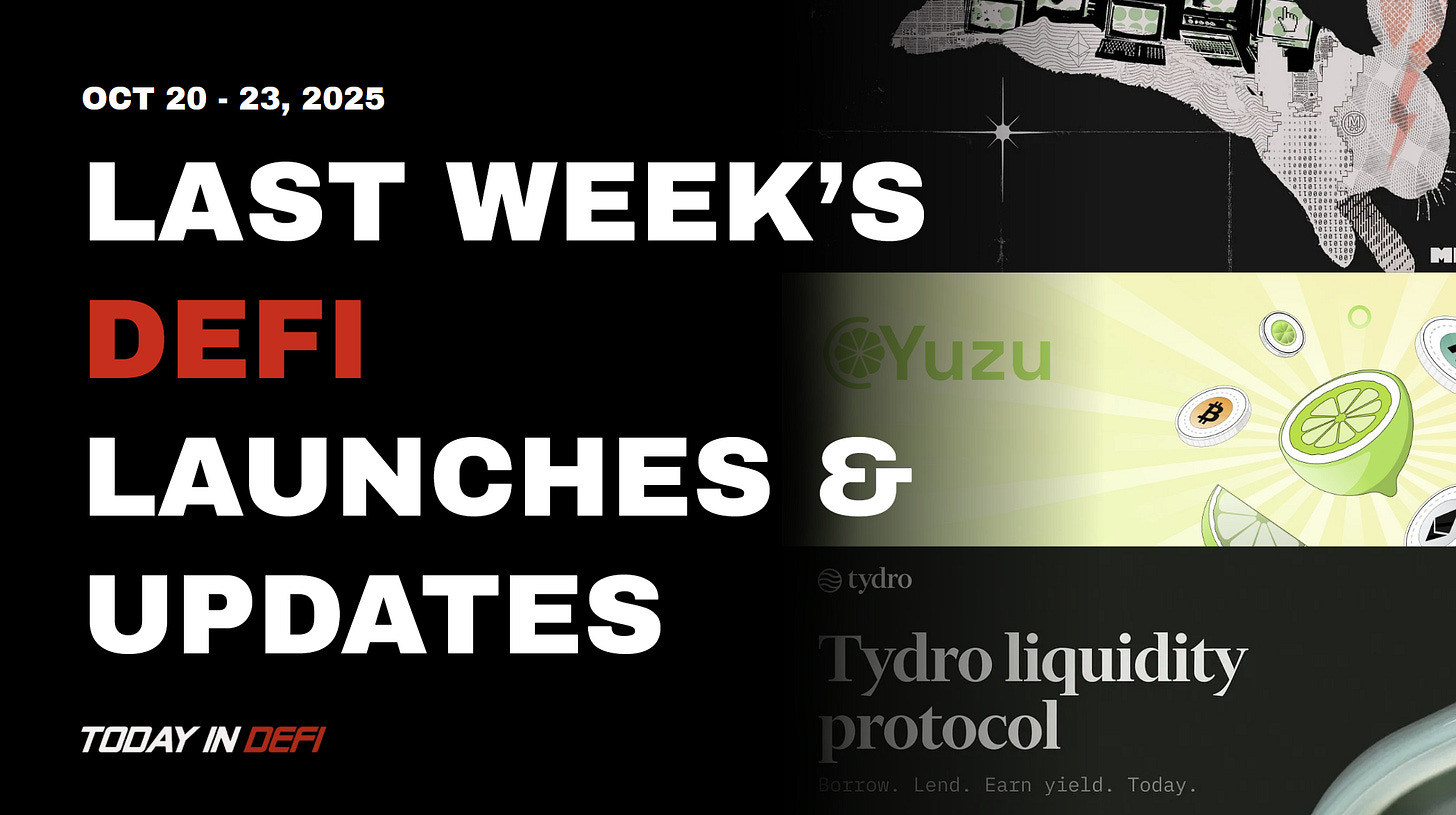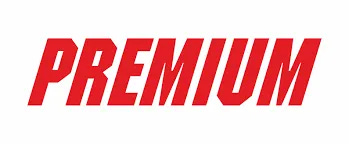LWID: Native Lending Protocol Launched on Ink, Yuzu Money Launches Yield Bearing Stablecoin, Jupiter Upgrades Trading Infrastructure, and many more...
Launches 🚀
Tydro launched as Ink’s native lending protocol built on Aave v3, bringing decentralized credit markets to the Ink ecosystem. Users can supply, borrow, and earn yield on assets like USDT0, USDG, wETH, kBTC, and GHO, while developers gain access to composable liquidity for new on-chain products.
Ethereal launched its Mainnet Alpha, introducing perpetual trading built around USDe with rewards for traders on their full margin balance. The rollout grants early access to the top 100 waitlist and testnet users, who can now deposit USDe and earn Season One points, USDe rewards, and Ethena points. The launch marks the first phase of Ethereal’s broader plan to build a full DeFi ecosystem around USDe, spanning spot trading, money markets, RWAs, and prediction markets.
Yuzu Money officially launched on Plasma, allowing users to mint yzUSD and stake it into syzUSD for yield. The protocol sets an initial cap of $30M and aims to make high DeFi yields accessible through a transparent and protected framework.
Jupiter launched Ultra v3, its most advanced trading infrastructure upgrade yet, featuring ShadowLane — a private, in-house landing engine with sub-second precision and 3x improved execution speed. The update adds 34x stronger MEV protection, real-time slippage estimation, and enhanced gasless support for Token-2022 and memecoin pairs.
Ultra v3 also revives inactive markets through just-in-time routing and integrates natively across Jupiter Web, Mobile, and Wallet for seamless multi-platform trading. Legacy API support will sunset as partners migrate to the new Ultra API powered by the Iris router.
Jupiter launched its first-ever prediction market in beta, powered by Kalshi liquidity, allowing users to trade on outcomes like the F1 Mexico Grand Prix winner. Traders can buy YES or NO positions for each choice, sell anytime before market close, and earn $1 per correct position at settlement. The beta phase introduces capped limits of 100K total and 1K per position.
mStable launched mPT-sUSDe, combining yields from Ethena, Pendle, and Aave to create leveraged, fixed-rate returns. The strategy layers Ethena’s sUSDe yield base, converts it into fixed APY via Pendle’s principal tokens, and amplifies returns through Aave’s leveraged money markets—delivering an optimized, multi-protocol yield product on Ethereum.
Superlend launched Superkat, a real-time yield engine on Katana that automatically allocates user deposits across top lending vaults via Morpho to capture the best blended APY.
Supporting USDC, USDT, ETH, and BTC, Superkat offers a one-click solution for earning optimized, diversified yield on Katana.
Melee launched its Alpha phase, introducing a permissionless prediction market blending elements of Pumpfun and Polymarket. Wave 1 participants can now access the platform to test its pricing mechanism that rewards users for being early and correct, with upcoming features including opinion and creator markets.
Nillion introduced Nillion 2.0, transitioning its Blind Computer to a decentralized model run by independent node operators and community checkers.
The $NIL token will power execution, governance, and participation, with redesigned tokenomics focused on sustainable emissions, staking, and value alignment.
Updates 📰
MegaETH announced its public sale on Sonar by Echo, starting at a $1M FDV and capped at $999M, offering 5% of $MEGA to the community. The sale follows last year’s record Echo raise with 3,000+ investors, including Dragonfly, Joseph Lubin, and Vitalik Buterin.
Allocation will prioritize long-term supporters based on social and onchain activity, with at least 5,000 participants receiving a baseline $2,650 allocation.
Spark launched Spark Savings V2, now supporting USDC, USDT, and ETH deposits with a 4.75% APY. The product emphasizes conservative risk management by minimizing exposure to perps and focusing on lending backed by BTC, ETH, and LSTs/LRTs. Users can also earn yield on ETH via SparkLend, with future expansion to include blue-chip LSTs like stETH.
Plume integrated M0 to power its native stablecoin, pUSD, enhancing its stability, interoperability, and programmability across onchain capital markets.
The collaboration combines Plume’s RWA-focused infrastructure with M0’s multi-issuer stablecoin framework, advancing programmable stability for the on-chain economy.
Elixir went live on Sui Network, expanding its institution-grade stable asset deUSD through LayerZero’s cross-chain infrastructure.
The launch integrates deUSD with four major Sui DeFi apps: Bluefin (for incentivized LPs with 3x Potion boosts), AlphaFi (leveraged yield farming vaults), Navi Protocol ($500M+ TVL lending markets), and Suilend (deep lending and borrowing liquidity).
Aerodrome introduced Aero Ignition, a new mechanism for launching tokens on Base through community-driven “Community Launches.” The system helps projects bootstrap deep liquidity, retain more token supply, and distribute tokens directly to the community from day one.
Greenlane Holdings announced a $110 million private placement led by Polychain Capital, with participation from Blockchain.com, Kraken, North Rock Digital, CitizenX, and dao5, to establish a Berachain-focused digital asset treasury strategy.
The initiative, called BeraStrategy, will allocate proceeds toward acquiring BERA—the native token of Berachain—making Greenlane one of the largest publicly traded BERA holders.
Usual initiated another 10M $USUAL buyback this week, equal to nearly 1% of its circulating supply, continuing its steady accumulation backed by protocol revenue.
Turtle raised $5.5M, bringing total funding to $11.7M, to expand its onchain liquidity infrastructure. Backed by investors like Bitscale Capital and Theia Research, the protocol connects projects and capital through a data-driven liquidity coordination layer, with 360,000 wallets and $5.5B routed to partners.
Renzo teased an upcoming integration with Wrapped Bitcoin ($WBTC), hinting at new Bitcoin-related features or yield opportunities within its ecosystem.
Berachain launched BEND, a Morpho-based lending layer developed with Re7 Labs to enable borrowing and lending within its ecosystem. The protocol extends Berachain’s Proof of Liquidity model by allowing users to earn on assets like HONEY while deepening onchain credit markets. BEND introduces native markets for HONEY, ETH, BTC, and major stablecoins, bridging the chain’s base yield from BERA staking with HONEY’s stable unit of account.
The system aims to serve as programmable credit infrastructure for builders, linking liquidity, lending, and incentives into a unified onchain economy.
Polymarket launched 15-minute up/down crypto prediction markets powered by Chainlink. The new feature allows users to bet on short-term Bitcoin price movements, expanding Polymarket’s suite of real-time prediction products.
SharpLink (SBET) expanded its ETH holdings to 859,853 ETH ($3.5B) after acquiring 19,271 ETH at an average price of $3,892. The firm raised $76.5M at a 12% premium, generated 5,671 ETH in staking rewards since June, and holds $36.4M in cash.
AUTOfinance (formerly Tokemak) launched a $2M buyback program ahead of its 1:1 TOKE-to-AUTO migration. The allocation represents over 10% of its current FDV, with the treasury holding around $21M in non-TOKE liquid assets.
Maple and Aave formed a strategic partnership to bring institutional-grade assets into Aave’s lending markets. Maple will introduce assets backed by stable, trusted yields to enhance capital efficiency and stabilize borrowing demand.
The collaboration begins with syrupUSDT’s listing on Aave’s Plasma market.
Meteora introduced three major upgrades to its launchpad suite — Presale Vaults, Meteora Invent, and Dynamic Fee Sharing. Presale Vaults let projects set customizable fundraising thresholds before token launch, Meteora Invent offers a simplified toolkit for deploying launch infrastructure, and Dynamic Fee Sharing enables flexible, non-custodial fee distribution models.
Liquid introduced Liquid Bets, a non-custodial parimutuel betting system running directly in Telegram. Users can create and join zero-sum markets funded via Hyperliquid addresses, with winnings distributed proportionally to each participant’s share of the winning pool.
VII Finance launched on Unichain with a feature that lets Uniswap V4 liquidity providers earn dual yield—swap fees plus lending interest. The protocol routes LP liquidity into curated Euler V2 markets, using a custom Uniswap V4 hook to distribute interest to active LPs automatically.
VII plans to next enable borrowing against LP positions.
Limitless unveiled $LMTS, a Base-based token powering its on-chain prediction markets for simple, liquidation-free trading. The 1B supply token offers staking perks, ecosystem incentives, and fee-based buybacks, aligning trading volume with long-term value growth through a self-reinforcing economy.
Issues ⚠️
Bunni announced it will shut down operations following the recent exploit, citing the high cost and lengthy process required for a secure relaunch. Users can still withdraw assets via the website, and remaining treasury funds will be distributed to BUNNI, LIT, and veBUNNI holders based on a future snapshot. The team relicensed Bunni v2 contracts under MIT to allow others to build on its innovations and will continue cooperating with law enforcement to recover stolen funds.
Moonwell suffered a $1.7M exploit on Base amid the Oct 10 market crash triggered by 100% U.S. tariffs on Chinese goods. The attacker exploited oracle-DEX price gaps during Binance’s margin system failure, flash-loaning cbBTC and USDC to borrow and dump VIRTUAL, MORPHO, and AERO. Liquidations failed as oracle spreads topped 30%, leaving $1.7M bad debt covered by $2.7M Base reserves. Over $12M total liquidations occurred across all chains.
ZachXBT detailed a case where a U.S. victim lost $3.05M (1.2M XRP) through an Ellipal wallet exploit, with funds traced to Tron and later laundered via Huione-linked OTC desks — an illicit Southeast Asian marketplace recently sanctioned by the U.S. The investigation revealed over 120 Ripple-to-Tron swaps through Bridgers and highlighted the dangers of confusion between custodial and non-custodial wallets.
ZachXBT urged faster reporting to prevent laundering, warned against predatory recovery firms, and noted the lack of strong victim support within the Ripple ecosystem.
Eclipse announced it will sunset tETH and tUSD, urging users to redeem both tokens via the official sites before December 31, 2025. After that date, redemptions will only be possible directly through the smart contract, though all funds will remain accessible.
Kadena announced it will cease all business operations and active maintenance of its blockchain effective immediately due to market conditions. While the company is winding down, the Kadena blockchain will continue functioning independently as a decentralized proof-of-work network maintained by miners and protocol developers.
The team will release a new binary to ensure network continuity and support a transition toward community governance. Over 566M KDA remain in mining rewards through 2139, and 83.7M KDA will unlock gradually until 2029.
For sponsorships, questions, or news tips, reach us at: support@todayindefi.com
Today in DeFi Premium includes early looks at promising projects, yield farming tips and guides, and deep research to help you get the most out of DeFi.
We published exclusive contents that will assist you in navigating your decisions, and help you make money in the market:
Earn 20%+ APY on Newly Launched Chain
Get a subscription with a credit card below, or pay in crypto for 2 months off a yearly subscription or $20 off a quarterly subscription.
Follow @todayindefi to keep up with the latest DeFi news on Twitter.
Disclaimer: Projects or tokens mentioned in this newsletter are often experimental or unaudited. Do your own diligence before using or buying anything mentioned.





